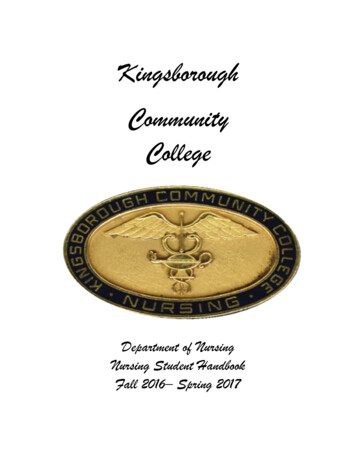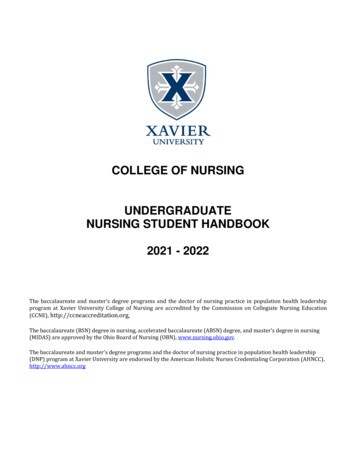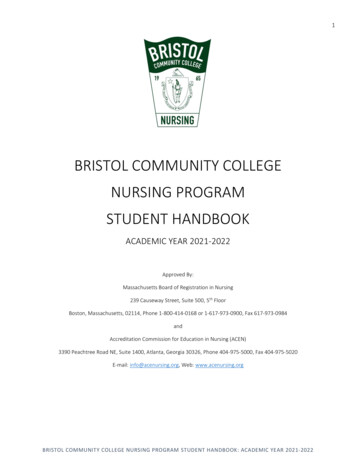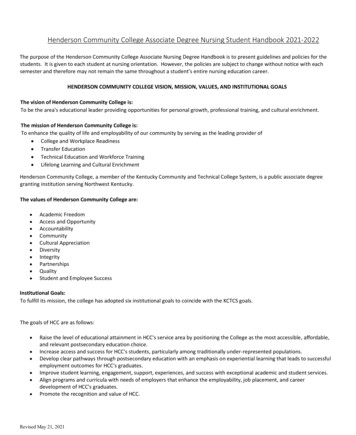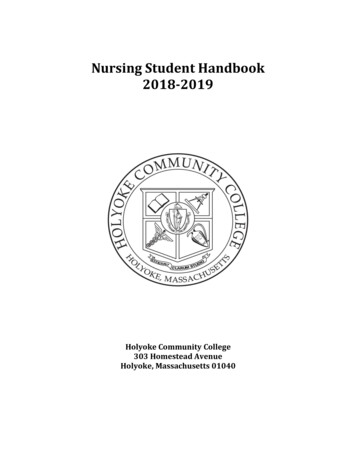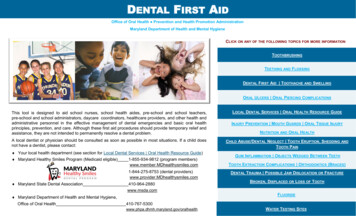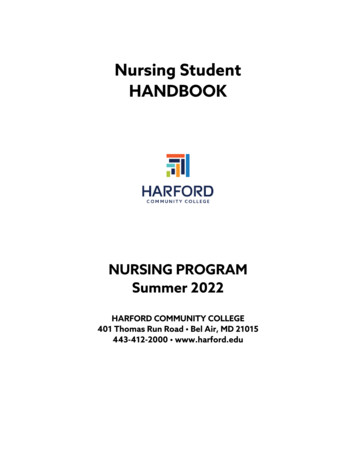
Transcription
Nursing StudentHANDBOOKNURSING PROGRAMSummer 2022HARFORD COMMUNITY COLLEGE401 Thomas Run Road Bel Air, MD 21015443-412-2000 www.harford.edu
NURSING STUDENT HANDBOOKTABLE OF CONTENTSNursing Program Mission, Vision and Philosophy . 3Program Outcomes, Associate Degree Nursing Program . 4Nursing Program . 5General Overview . 7Licensed Practical Nursing to Registered Nurse Transition (LPN to RN) . 7Accreditation . 7Nondiscrimination and Grievance Process . 8Organization of the Curriculum . 9Progression Policy . 11Nursing Faculty . 13Academic Policies . 15Attendance . 17Course Withdrawal . 17Grading Policies . 17Grading Scale . 18Rounding of Scores . 18Academic Honesty. 18Exam Policy . 18Test and Assessment Center. 19Tape Recording in Classroom . 19Handouts . 19Technology Etiquette . 19Email Accounts . 19Guidelines for Written Assignments . 19Guidelines for Academic Success . 19Student Testing Policy . 20Classroom Etiquette . 22Simulation Lab – Code of Conduct. 23Clinical Policies . 25Clinical Attire . 27Clinical Accountability . 28Medications . 28Clinical Competency . 28Guidelines for Clinical Success. 29Attendance . 29Illness/Absences/Concerning Behaviors . 29Injury during Clinical . 29Mobile Devices . 30Clinical Requirements Related To Health Maintenance & CPR Certification . 30Criminal Background and Drug Screening . 30Confidentiality and Security of Information . 31Computer Passwords . 311
TABLE OF CONTENTS (continued)Clinical Evaluation and Remediation . 33Clinical Evaluation . 35Remediation Policy . 36Performance Improvement Plan . 37Support Services . 41Nursing Student Success and Retention Specialist . 43Academic Progression and Clinical Coordinator . 43Disability Support Services (DSS) . 43The Learning Center . 43Financial Aid . 43Test and Assessment Center. 43Minority Achievement Program (MAP) . 44Academic Advising and Transfer Services . 44Career Services . 44Information Technology (IT) . 44Note . 44Student Participation in College Life . 45Student Nurses’ Association . 47Gamma Upsilon Nursing Honor Society . 47Student Representation to Nursing Faculty Meetings . 47HCC Student Activities . 48Frequently Asked Questions . 49-53Pathogen Exposure Plan . 55Exposure Procedure . 57Professional Standards . 59Quality and Safety in Nursing Education . 61NSNA Code of Professional Conduct . 62NSNA Code of Academic and Clinical Conduct . 63Social Media Guidelines . 64ANA Standards of Professional Nursing Practice . 66ANA Code of Ethics for Nurses . 68Appendix. 69Nursing Technical and Professional Standards. 71Guidelines for the Virtual Environment . 73Student Signature Form . 752
Harford Community CollegeNursing ProgramMissionThe nursing program, in partnership with the community, provides a learner-centered environment toeducate students for entry level practice into the profession of nursing. The program supports educationalexcellence by fostering an instructional climate that encourages lifelong learning, respect for diversity,creativity, service to others, accountability, and teamwork.Philosophy and Core ConceptsNursing, as an art and a science, is a dynamic discipline that integrates increasingly complex knowledge,skills, and technologies to provide safe and effective individualized client care. Client care is delivered acrossthe lifespan with the intent to promote health, prevent illness, and manage health care needs. The coreconcepts are integrated throughout the curriculum and reflect the program’s philosophy. The term client isdefined as the individual, family, and/or community. Caring: The nurse and client engage in a therapeutic relationship in an atmosphere of mutual trustand respect. Central to this relationship is recognition of the client’s individuality, with considerationfor cultural, societal, and environmental influences. In this client-centered relationship, the nurseprovides encouragement, hope, support, and compassion to help achieve mutually agreed uponoutcomes. Teamwork and Collaboration: The nurse functions effectively within the inter-professional team,respecting the centrality of the client and family as core members of the healthcare team. The goalsof teamwork and collaboration are to foster open communication, mutual respect, and shareddecision making to achieve quality, client-centered care. Nursing Practice: The nurse utilizes an evidence-based, systems thinking approach to safe clientcare that incorporates the nursing process to assess, analyze, plan, implement, and evaluate aunique plan of care that aligns with the client’s values and preferences. The nurse uses teaching andlearning principles to assist the client to participate in care and decision making. The goals of thenursing process include protecting, promoting, and restoring health and promoting dignity in death.The nurse utilizes the nursing process to continuously improve client and population outcomes. Professional Performance: The nurse as a leader is accountable, and practices within legal, ethical,and regulatory standards. The goals of professional performance are to continually developprofessionally using self-assessment, self-care, and goal setting to maintain competence; and tomaintain a professional image in appearance and conduct that reflects core professional values ofrespect, confidence, trust, responsiveness, integrity, and compassion. Safety: The nurse has an unwavering responsibility to prevent harm to clients across all settings. Thenurse promotes high quality outcomes through a proactive approach in coordinating care amongother healthcare professionals, organizations and clients. The nurse utilizes technology andinformation systems with application of evidence-based practice to support safe processes of care.The nurse examines near-misses or instances of harm with integrity, self-reflection andtransparency.Revised: 12/2013Revised: 6/20193
Associate of Science Degree Nursing ProgramProgram Student Learning Outcomes(PSLOs)With the guidance of the Mission, Philosophy & Core Concepts, the graduate of the Associate of SciencesDegree Nursing Program at Harford Community College will:1.Practice nursing in a caring manner2. Collaborate with clients and other members of the health care team3. Utilize nursing practice to continuously improve client and population outcomes4. Demonstrate professional performance within legal, ethical, and regulatory standards5. Use safe practices and processes to promote high quality outcomesRevised 12/2013Revised 6/20194
1SectionHARFORD COMMUNITY COLLEGENursing Student HandbookNursingProgram5
6
General OverviewHarford Community College offers a nursing program which allows students to enroll in an Associate ofSciences Degree Nursing Program (RN) with two options: Traditional and Day Accelerated. Studentscomplete the nursing courses in four consecutive semesters.Traditional: Classroom instruction is scheduled on selected weekdays, during daytime hours. Clinical hours can be either daytime or evening hours and at time may also occur on weekends.Students must be prepared to participate in the clinical experiences to which they are assigned.Due to the availability of clinical sites, this will vary from course to course. Classes are not typically scheduled during the summer session.Day Accelerated: Classroom instruction is scheduled on selected weekdays, during daytime hours. Clinical hours can be either daytime or evening hours and at time may also occur on weekends.Students must be prepared to participate in the clinical experiences to which they are assigned.Due to the availability of clinical sites, this will vary from course to course. The 1st and 4th semester occur in the summer.Admission to the National Licensure Examination for Registered Nursing is determined by the Maryland Board of Nursing. By law, the Maryland Board of Nursing may deny licensure for a variety of reasons whichmay include conviction of a felony or crime involving moral turpitude, if the nature of the offense bearsdirectly on the fitness of the person to practice nursing.Licensed Practical Nursing to Registered Nurse Transition (LPN to RN)Currently licensed practical nurses (LPN’s) may enroll in the Associate of Science Degree Nursing Program(RN) upon successful completion of the LPN-RN transition course. The LPN-RN transition course is offered during the fall and spring semesters in a hybrid format withdidactic portions offered on-line. On-campus lab skill instruction and evaluation of skills is a component of this course. Students matriculate into the RN program at the appropriate semester level based on successfulcompletion of the transition course.AccreditationThe Associate of Science Degree Nursing Program is approved by the Maryland Board of Nursing. TheAssociate of Science Degree Nursing Program is accredited by the Accreditation Commission for Educationin Nursing. Contact information: 3343 Peachtree Road NE, Suite 850 Atlanta, Georgia 30326 Phone: (404)975-5000 Fax: (404) 975-5020 Email: info@acenursing.orgWeb: www.acenursing.org. Students may directly contact ACEN, if deemed necessary, with questions orconcerns.7
Non-Discrimination Policy and Grievance ProcessThe Nursing program adheres to the non-discrimination policy of Harford Community College. The Boardof Trustee Policy states: “Harford Community College is committed to non-discrimination and equalemployment opportunity. It has been, and will continue to be, the policy of Harford Community College thatall employees, applicants, and other persons dealing with the College will do so in an atmosphere that is freefrom discrimination on the basis of race, color, religion, sex, national origin, age, status as an individual witha disability, veteran, sexual orientation, marital status, or any other status protected by law. This policyincludes, but is not limited to, decisions about recruitment, hiring, training, promotion, compensation,benefits, transfers, and social or recreational programs.As part of its commitment to equal employment opportunity, the College prohibits harassment of any kind.The College will not tolerate harassment by anyone—supervisors, other employees, students, contractors,or other persons under control of the College.Revision date: Nov. 11, 2014Procedure:Examples of unlawful harassment include use of epithets, slurs, or other language that is derogatory oroffensive to members of a protected class, fostering stereotypes of behavior, actions, language, ormannerisms that is intended to characterize members of a protected class, and production, circulation, oruse of graphic material that is offensive, such as swastikas.Any employee or other person who believes that there has been a violation of this procedure should report itto the Chief Human Resources Officer (CHRO), any dean, vice president or the president. A promptinvestigation will be undertaken. Anyone who violates this policy will be subject to appropriate penalties,with employees subject to disciplinary action up to and including discharge.Revision date: September 1, 2010All nursing students are expected to follow the HCC Grievance Process. Details are located in the on-lineHCC College Catalog at ghts-andresponsibilities.aspx8
Organization of the Associate Degree in Nursing CurriculumNURS 101: Fundamentals of Nursing (15 weeks day traditional, 12 weeks accelerated tracks) In this course,students use the nursing process to assess, plan, implement, and begin to evaluate evidence-based care of an olderadult client in a variety of care settings. Students use professional standards of nursing and begin to develop theirindividual practice as a student nurse. The core concepts of safety, caring, teamwork and collaboration are woventhroughout the course. Course includes 60 lecture hours, 30 laboratory hours, and 90 clinical hours.NURS 105: Medical-Surgical Nursing I (15 weeks)In this course, students use the nursing process to implement a client-centered plan of care for an adult client inthe medical-surgical setting. Students organize and provide care to support the client’s physical, psychosocial, andspiritual needs. Safety, quality improvement, and teamwork and collaboration are emphasized. Students continueto build a personal practice of professionalism through evidence based clinical practice and theory application.Course includes 30 lecture hours and 112.5 clinical hours.NURS 110: Mental Health Nursing (15 weeks)In this course, students use the nursing process to implement a plan of care for clients with mental health issues.Students organize and provide care that incorporates concepts of therapeutic communication, shared-decisionmaking, and evidence-based practice to effectively support health promotion and maintenance of the client. Anemphasis is placed on legal and ethical standards in the mental health setting. Students are challenged to reflect ontheir own assumptions, behaviors, and methods of communication. Course includes 30 lecture hours and 45clinical hours.NURS 112: Contemporary Issues in Nursing (15 weeks; on-line only)In this course, students gain insight into the impact of contemporary issues on professional nursing practice.Students discover how current trends in health care affect their personal practice as registered nurses andcontribute to the overall health of our nation.NURS 210: Medical-Surgical Nursing II (15 weeks)In this course, students use the nursing process to formulate a client-centered plan of care for adult clients in themedical-surgical setting. Students function effectively within the health care team to advocate for their client’sneeds and support a culture of safety and quality improvement. Core professional values are utilized as studentsdevelop and maintain competence in nursing practice. Course includes 37.5 lecture hours and 90 clinical hours.NURS 220 – Maternal - Newborn Nursing (15 weeks)In this course, students use the nursing process to formulate a client-centered plan of care for the health andwellness needs of maternity and newborn clients. Students function effectively within the health care team toadvocate for their client’s needs and support a culture of safety and quality improvement. Core professionalvalues are utilized as students develop and maintain competence in nursing practice. Course includes 30 lecturehours and 45 clinical hours.NURS 230 – Pediatric Nursing (15 weeks)In this course, students use the nursing process and principles of growth and development to formulate a clientcentered plan of care for the health and wellness needs of the pediatric client and family. Students functioneffectively within the health care team to advocate for their client’s needs and support a culture of safety andquality improvement. Core professional values are utilized as students develop and maintain competence innursing practice. Course includes 30 lecture hours and 45 clinical hours.NURS 211: Medical-Surgical Nursing III (15 weeks day traditional, 12 weeks accelerated tracks)In this course, students use the nursing process to create and coordinate a client centered plan of care for adultclients in high acuity settings. Students integrate safety, quality improvement, and teamwork and collaboration asthey manage care to meet a client’s physical, psychosocial, and spiritual needs. Integrity and accountability are9
essential components of students’ nursing practice as they demonstrate competent care. Course includes 60 hoursof lecture and 225 hours in a clinical setting.NURS 212: Leadership in Nursing (15 weeks; on-line only)In this course, students explore and develop their professional responsibilities as a registered nurse. Courseactivities engage the student in learning leadership and management concepts and their application to teamworkand collaboration. Safety, nursing practice and professional performance issues are the focus of learning to allowstudents to make a successful transition to practice.Rev 4/202210
NURSING PROGRAM PROGRESSION POLICYThe nature of the nursing curriculum, where one concept builds upon another, requires an orderly,sequential progression which follows the curriculum plan. Students are expected to meet with AcademicAdvising to plan their course of study. Any break in the sequence of progression due to withdrawal,failure of a required course (after Fundamentals of Nursing (NURS 101)), failure to maintain a minimumGPA of 2.0, or any need for a leave of absence from the nursing program, will require a written requestfor course re-enrollment to the Dean of Nursing and Allied Health Professions.A nursing student is permitted one failure in a clinical course, or one withdrawal failing, after completionof NURS 101. An unsatisfactory final clinical evaluation in any nursing course will result in a coursefailure. Course failure occurs when a student either 1) earns an exam average of 74.50%; or 2) afterachieving an exam average of 74.50% fails to earn a final course grade of C or better (74.50%).Withdrawal failing occurs when the student’s exam average is 74.50% when they withdraw from thecourse.A student may be immediately dismissed from the nursing program if behavior is demonstrated thatjeopardizes the safety of others, violates the confidentiality and security of information policy (seeSection 3), HIPAA regulations, and/or does not meet safe standards of care for nursing practice.In addition, the following apply regarding progression within the nursing program: A student who has a course failure, withdraws failing, or has a course failure resulting fromunsatisfactory clinical evaluation during the NURS 101 course will fail NURS 101. This course failurewill result in the student being dismissed from the nursing program. A student who has a course failure, withdraws failing, or has a course failure resulting fromunsatisfactory clinical evaluation, in any course after NURS 101, will fail that course. The student maybe readmitted to the course with the condition that the student has written a request for readmission to the Director for Nursing Education (DNE) and has submitted a Student PerformanceImprovement Plan (SPIP) developed collaboratively with the Nursing Student Success and RetentionSpecialist. The student must have the SPIP in place prior to enrollment in the next nursing courseand a copy of the SPIP must be given to the course coordinator. A student who has a clinical failure, after completion of NURS 101, will have their clinicaldocumentation reviewed by a nursing faculty committee. The committee will determine if theclinical failure will result in dismissal from the nursing program or if the student may progress with acourse failure on record. Failure of a prerequisite course will halt progression until successful completion of that prerequisitecourse. A student who has two failures in clinical courses will be dismissed from the program. Any student, who is dismissed from the nursing program for any reason, is no longer eligible for reenrollment into the nursing program. The nursing program follows the same academic appeal process as the College.Revised 12/2021, 9/2021, 6/6/2019, 5/22/2018, 5/26/201511
12
NURSING CONTACT INFORMATIONNameTelephone #Interim Dean, Nursing and Allied Health ProfessionsSonia Galvan443-412-2545Room #EmailDH-105sgalvan@harford.eduDirector for Nursing EducationDale ultyElizabeth AndrewsAlicia GaineyMary Beverly GallagherDeanna GarzaAmanda GirardiNatasha LawsonAshley MeiselGretchen MirabileJessica PowersBrandi RobinsonJoseph SantopietroLaura enk@harford.eduClinical Simulation LabCathy SikoraCynthia CespedesKristin McCrearyBetsie ord.eduNursing Student Success and Retention Specialist(New-Hire Pending)443-412-2749DH-218Academic Progression and Clinical CoordinatorRebecca ive Assistant IIIAmy nistrative Assistant IIAnnabel 3
14
2SectionHARFORD COMMUNITY COLLEGENursing Student HandbookAcademicPolicies15
16
ACADEMIC POLICIESAttendance:The College recognizes that successful student performance in college courses isdependent upon regular attendance and participation. Therefore, students areexpected to attend all classes and to participate in all learning activities. Missedclass time due to obligations such as religious practice, jury duty, military service,or participation in authorized College extracurricular activities will be consideredexcused absences. Students are responsible for contacting their instructorsregarding all attendance matters. Documentation may be required for anyexcused absence. Violation of the Student Attendance Policy could result in lossof financial aid, removal from the course, and/or failure of the course.Students will be considered in violation of the HCC Attendance Policy if any ofthe following apply:Face-to-face classes: If at any time, a student has consecutiveunexcused absences from scheduled classes equal to 13% of theinstructional term.Hybrid classes: If a student has any combination of consecutiveunexcused absences or missed on-line assignments, quizzes or testsequal to13% of the instructional term.Students ar
NURSING PROGRAM . Summer 2022 . HARFORD COMMUNITY COLLEGE . 401 Thomas Run Road Bel Air, MD 21015 . 443-412-2000 www.harford.edu . 1 . . Harford Community College offers a nursing program which allows students to enroll in an Associate of Sciences Degree Nursing Program (RN) with two options: Traditional and Day Accelerated. .


